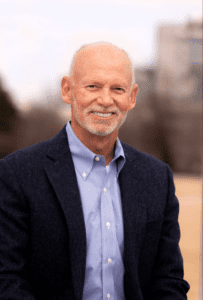
Just before his retirement as CEO of Charter Construction in Nashville, we asked Turner Talley to join us in conversation to reflect on a legacy defined by adaptability, leadership, and an unwavering commitment to his team.
His journey, spanning over four decades, encapsulates the evolution of the modern construction industry, the rise of technology, and the value of resilience in a constantly shifting industry and market landscape.
Building a Career from the Ground Up
Talley’s story begins in 1978 when, as a high school student, he began developing an outstanding work ethic by earning paychecks during his summer and winter vacations as a day laborer with Charter Construction.
“Working in the field was invaluable,” Turner recalls. “It gave me perspective about what our employees do and compassion for how difficult the work can be at times.”
From an early age, Turner’s father instilled in him the belief that engineering was the ultimate educational foundation for any type of career that focused on complex problem-solving. That inspiration led Turner to earn his own engineering degree from the University of Tennessee in 1982.
After graduation, he applied for an entry-level position at Goodyear Atomic in Ohio, which produced enriched uranium for use in the U.S. nuclear weapons program and Navy nuclear propulsion. However, a nearly 8-month delay in obtaining his required security clearance gave Turner time to develop second thoughts about his career path.
Bush Sneed, one of Charter Construction’s owners at the time, learned about Turner’s situation and invited him to work for the firm while he waited for his new job to officially start. Upon accepting the invitation, Turner returned to Nashville in 1983 and took on a role as a project manager at Charter Construction.
He quickly adapted, wearing multiple hats as a project manager, estimator, and safety supervisor. And his ability to embrace technology in the workplace early on would later prove invaluable.
Adapting to a Shifting Industry
Around 1994, Turner recognized a troubling trend: seasoned professionals were being pushed out of the industry due to their inability to adapt to new technologies. Many construction companies were making the shift to computer-based project management, and those who couldn’t keep up found themselves unemployed.
Turner saw this as a cautionary tale and resolved to take control of his career by starting and owning his own construction company.
Coincidentally, Bush Sneed had been considering an early retirement around the same time that Turner felt a calling to venture out on his own. He offered Turner a five-year plan to ultimately take control of Charter Construction. The transfer came to fruition in 1999, when Talley became the company’s majority shareholder.
Overcoming Challenges and Leading Through Adversity
Throughout his tenure, Charter Construction faced numerous challenges that tested its ability to adapt to market fluctuations and prove its quickly growing reputation as a leading concrete contractor in Middle Tennessee. One of the most significant was the Medical Research Building IV project at Vanderbilt University in 2004. With minimal structural drawings and mounting pressure, the project became a turning point for both Turner and his team.
It was during this time that he developed a deep trust in Richard Wilson, a rising star within the company. The two navigated the project’s difficulties together, forging a bond that would shape Charter’s future.
The 2008 recession presented another major hurdle. Turner and Richard devised a strategy that allowed them to keep their workforce employed by splitting crews and taking on multiple projects simultaneously. This approach not only kept the company afloat but also laid the groundwork for Charter’s expansion in the following years.
A Transition of Leadership
As Turner neared retirement, his focus shifted to ensuring a seamless transition for Charter Construction. He emphasized financial stability, technological advancements, and leadership development.
In 2011, recognizing Wilson’s exceptional capabilities, Turner named him a future partner in the company. Over the past year, Richard has been at the helm, driving Charter’s expansion and incorporating innovative technology to streamline operations.
Turner takes great pride in seeing Richard and the leadership team continue to build on Charter’s legacy. Their commitment to creating a supportive work environment and maintaining the company’s competitive edge reassures him that the future is in good hands.
Life After Charter
As he steps into retirement, Turner is embracing a new chapter filled with travel, golf, and time spent with his family. While he has remained involved in leadership meetings and board discussions over the past year, he is content to fully step back and support the company’s next generation of leadership. He acknowledges the weight of retirement as a major decision but finds comfort in knowing that Charter Construction is well-positioned for continued success.
“Retiring has been an emotional journey for me,” says Turner. “But I’m grateful that I don’t have any anxiety at all. And that speaks to Richard and the leadership team that’s supporting him and the company as a whole.”
Reflecting on his journey, Turner remains grateful for the opportunities, challenges, and relationships that have shaped his career. His story serves as an inspiration to future leaders in the industry—demonstrating the importance of adaptability, perseverance, and a steadfast commitment to the people who make success possible.
